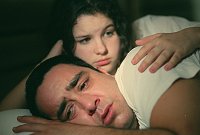
with Ellen Barkin, Richard Masur, Jennifer Jason Leigh, Sharon Wilkins, Hannah Freiman, Rachel Corr, Valerie Shusterov, Shayna Levine, Will Denton, Emani Sledge, Debra Monk, Stephen Adly-Guirgis, Richard Riehle, Matthew Faber, Alexander Brickel, Robert Agri
release US 15.Apr.05, UK 6.May.05
04/US 1h40

"She's my half-daughter!" Adly-Guirgis and Levine



 Support Shadows: Buy a Poster
Support Shadows: Buy a Poster
|
 Solondz continues to engage us with real characters who do hideously real things to each other. And he also continues to venture into more surreal, twisted territory with his intelligent but often baffling approach to storytelling.
Solondz continues to engage us with real characters who do hideously real things to each other. And he also continues to venture into more surreal, twisted territory with his intelligent but often baffling approach to storytelling.
Aviva (played by eight actresses of various age, size and race) is a 12-year-old struggling with the concepts of birth and death. Her parents (Barkin and Masur) continually brush such topics under the carpet, even pushing Aviva toward a hush-hush abortion when she gets pregnant by a family friend. But she runs away from home and takes a warped fairy-tale trip through a variation on her mother's emotional blackmail scenario ("You might have a deformed child! People will think you're a slut!").
A palindrome is a word that reads the same forwards as backwards, like "Aviva". Solondz's main question is whether people really change, or do we stay the same inside. He addresses this from a bewildering array of angles in the film's nine chapters, examining fundamentalism and moral relativism through such issues as disability, abortion, terrorism and paedophilia. And with his blackly hilarious approach, he also gets us laughing--often uncontrollably--at the most taboo things imaginable.
Having eight actresses play the protagonist is extremely gimmicky, but Solondz inventively uses this to add resonance to the character. Intriguingly, the extremely varied actresses all play the role the same way. Wilkins' sheer physicality gives her scenes an astonishing subtext; Jason Leigh's aging face adds an emotional punch in the penultimate episode; and Freiman is the other standout, a gawky redhead with braces in the film's most gruelling scenes.
The stylised, fable-like acting is especially noticeable in the amazing central chapter featuring the chirpy, religious Mama Sunshine (Monk) and her 10 foster children, all of whom have some sort of disability and embrace the simplistic fundamentalism of their adoptive parents. But of course dark shadows lurk everywhere, especially as Solondz brings up al Qaida and extreme anti-abortionists (although he lets us make the connection). Yes, Solondz is far too clever for his own good, but the film is surprisingly moving on an emotional level, and it'll certainly spark a lively post-film deconstruction.
 |
strong adult themes, language, sex | 18.Oct.04 lff |

 Still waiting for your comments ... don't be shy.
Still waiting for your comments ... don't be shy.
HOME | REVIEWS | NEWS | FESTIVAL | AWARDS | Q&A | ABOUT | TALKBACK